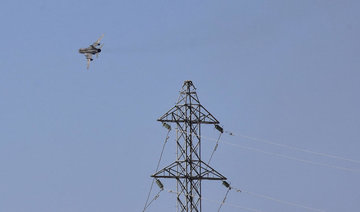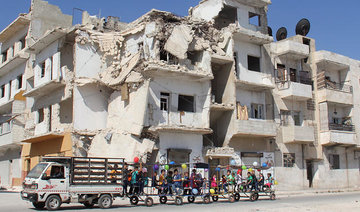DEIR EZZOR: After breaking a Daesh blockade, the Syrian regime’s army is seeking to encircle the remaining terrorist-held parts of Deir Ezzor city, a military source said Wednesday.
The city is the capital of oil-rich eastern Deir Ezzor province, regarded as a strategic prize by both Russian-backed Syrian regime troops and US-backed fighters.
In Damascus Wednesday, President Bashar Assad said the country was “advancing steadily toward victory thanks to the sacrifices of its army, the determination of its people and the support of its allies,” state news agency SANA said.
Last week, the Syrian regime army and allied fighters broke a yearslong Daesh siege of Deir Ezzor, entering two regime-held sections of the city that had been cut off from each other.
Since then, the army has brought reinforcements to the city and is seeking to oust Daesh from eastern neighborhoods that run along the Euphrates river, which slices diagonally through the province.
“The army is seeking to encircle Daesh from three sides by controlling the parts of the western bank of the Euphrates river,” the source told AFP.
Troops would target riverside territory on the city’s northwestern edges as well as strategic areas on its southern outskirts, including the key military airport and the village of Al-Jafra, on the banks of the Euphrates.
The operation seeks to “oust Daesh from the city and the province completely,” the military source said.
Rami Abdel Rahman, head of the Syrian Observatory for Human Rights monitor, also reported that “fierce fighting has been ongoing since yesterday as the army seeks to expel the militants and reach the western bank of the Euphrates.”
If the army captures Al-Jafra, “Deir Ezzor will be encircled from three sides, so Daesh will have no way out except the Euphrates which is within firing range of regime artillery and Russian warplanes,” he added.
As the Syrian army backed by Russian air support battles Daesh in Deir Ezzor, a separate offensive by the US-backed Syrian Democratic Forces is under way on the eastern side of the province.
The operation by the alliance of Kurdish and Arab fighters began over the weekend, but the SDF has said it was not coordinating the fight with the regime.
Airstrikes by Russian and US-led coalition warplanes in support of the separate offensives have killed dozens of civilians in recent days.
On Wednesday, the Observatory said suspected US-led coalition strikes on several parts of eastern Deir Ezzor province overnight and throughout the day killed 12 people.
On Tuesday, the monitor reported 35 people killed in Russian and US-led strikes on either side of the Euphrates.
More than 330,000 people have been killed in Syria since the conflict began in March 2011 with anti-regime protests.
In a separate development, Tehran has signed several agreements with its ally Damascus to improve the production and distribution of electricity in war-ravaged Syria, officials in Iran and Syrian state media said Wednesday.
The deals were signed in Tehran by Syrian Electricity Minister Mohammed Zuhair Kharboutli and Sattar Mahmoudi, the acting head of Iran’s energy ministry, the sources said.
Mahmoudi, in statements published on the ministry’s website, said the deals to rebuild Syria’s electricity infrastructure damaged during the country’s six-year war were worth “several hundred million euros (dollars).”
Syrian troops try to encircle Daesh in Deir Ezzor
Syrian troops try to encircle Daesh in Deir Ezzor

Where We Are Going Today: ‘Phet Phet’ Thai restaurant in Riyadh

Located at Pure Center on Takhassusi Road, Phet Phet is one of the boldest Thai kitchens to hit Riyadh — and it lives up to its name, which literally means “very spicy.”
With its neon signs, playful branding, and sleek modern seating, the place feels like a Bangkok street stall reimagined with modern aesthetics.
The menu leans heavily into bold, unapologetic flavors. I started with the shrimp cashew for SR75 ($20) — a standout dish that combined sweet, savory, and spicy notes perfectly, with just the right crunch.
Another favorite was the tom yum nam khon for SR 55, a rich and creamy soup layered with lemongrass, lime, and plump shrimp. It was intense and comforting at the same time.
Among the many appetizers we tried, the pow pow shrimp, chili wontons, and prawn toast all delivered.
The pad ki mao chicken and panang curry chicken were flavorful, with deep spice profiles that felt authentic. Even side dishes like sticky rice, coconut rice, and the playful Kinza cola added to the experience.
For dessert, the mango sticky rice (SR 35) offered a cool, sweet end to the fiery meal.
The place runs on energy — fast service, loud tables, and constant movement from the open kitchen to the packed dining area.
But here’s the only downside: Phet Phet is small. With how popular it already is, the space can feel cramped, and getting a seat without a wait is tricky.
Still, for those who love real heat, bold flavors, and a vibe that feels straight out of Thailand, Phet Phet is a must-visit.
For more information, check their Instagram @phetphetsa.
GCC chief receives newly appointed Omani ambassador to Saudi Arabia

Secretary-General of the Gulf Cooperation Council Jasem Mohamed Albudaiwi received Sayyid Najib bin Hilal Al-Busaidi, Oman’s newly appointed ambassador to Saudi Arabia, in Riyadh on Tuesday.
Albudaiwi congratulated Al-Busaidi on his appointment and wished him success in his duties.
The parties discussed various topics and explored ways to enhance bilateral efforts toward “greater integration, solidarity, and interconnectedness.”
They also looked at the latest developments in regional and international arenas.
What We Are Reading Today: ‘Birds at Rest’ by Roger Pasquier

“Birds at Rest” is the first book to give a full picture of how birds rest, roost, and sleep, a vital part of their lives.
It features new science that can measure what is happening in a bird’s brain over the course of a night or when it has flown to another hemisphere, as well as still-valuable observations by legendary naturalists such as John James Audubon, Alfred Russel Wallace, and Theodore Roosevelt. Much of what they saw and what ornithologists are studying today can be observed and enjoyed by any birder.
Huge dust storm sweeps into Iran, affecting millions

- State television urged people to remain inside and wear face masks if they had to go out
TEHRAN: Iranian authorities ordered schools and offices closed in seven western provinces Tuesday as a dust storm swept in from neighboring Iraq, with around 13 million people told to stay indoors.
Khuzestan, Kermanshah, Ilam and Kurdistan provinces were all affected, and state television cited local officials as blaming the closures on high levels of accumulated dust.
Government and private offices also shut in several provinces including Kermanshah and Ilam, as well as Khuzestan in the southwest.
Zanjan in the northeast and Bushehr in the south were also hit.
Bushehr, nearly 1,100 km south of Tehran, was given an Air Quality Index of 108 on Tuesday, rated “poor for sensitive groups.”
That figure is more than four times higher than the concentration of air microparticles deemed acceptable by the World Health Organization.
Iran’s meteorological authorities said the conditions were caused by “the movement of a large mass of dust from Iraq toward western Iran.”
State television reported low visibility in some areas and urged people to remain inside and wear face masks if they had to go out.
Last month, a similar dust storm in Iraq grounded flights and sent thousands of people to hospital with breathing problems.
On Monday, Iran’s IRNA state news agency said more than 240 people in Khuzestan province had been treated for respiratory issues because of the dust.
A spokesperson for the emergency services also told Tasnim news agency on Tuesday that nine people had died as a result of storms in Iran over the past seven days, ending on Monday.
“Four of the deaths were caused by strong winds and falling objects, and five were caused by lightning strikes,” it added.
Putin tells Pezeshkian Russia wants ‘fair’ US-Iran nuclear deal

- The latest round of the talks between Tehran and Washington, initially set for May 3, was postponed, with mediator Oman citing ‘logistical reasons’ for the delay
- Russia has deepened its military and diplomatic ties with Iran since it launched its offensive on Ukraine in February 2022
MOSCOW/TEHRAN: Russian President Vladimir Putin on Tuesday told his Iranian counterpart Masoud Pezeshkian that Moscow wants a “fair” nuclear deal between the US and Iran and was ready to help advance talks, the Kremlin said.
“The Russian side confirmed its readiness to contribute to the promotion of this dialogue with the goal of reaching a fair agreement based on the principles of international law,” the Kremlin said in a readout of a call between the leaders.
The latest round of the talks between Tehran and Washington, initially set for May 3, was postponed, with mediator Oman citing “logistical reasons” for the delay.
The two countries have held three rounds since April 12, their highest-level contact since the US withdrew from a landmark deal with Iran in 2018, during Donald Trump’s first term as president.
Russia has deepened its military and diplomatic ties with Iran since it launched its offensive on Ukraine in February 2022.
The two countries, both under massive Western sanctions, signed a strategic partnership earlier this year.
Most recently, Moscow has sent two planes to help put down a fire after a deadly explosion in Iran’s biggest commercial port.
Russia earlier confirmed its readiness to help find a diplomatic solution to the stand-off between Washington and Tehran, and to play any role in the talks.
A fourth round of talks is likely to take place over the weekend in Muscat, with Iranian state media pointing to May 11 as a probable date.
Cautioning that the timing was not yet finalized, an Iranian source close to the negotiating team said: “The talks will take place over two days in Muscat, either on Saturday and Sunday or Sunday and Monday.”
Top US negotiator Steve Witkoff also said Washington was trying to hold the next round of talks this weekend, according to the news site Axios, a day after Iran’s Foreign Ministry reiterated
US President Donald Trump, who withdrew the US from a 2015 nuclear deal between Iran and world powers, has threatened to bomb Iran if no agreement is reached with his administration to resolve the long-standing dispute.
Western countries say Iran’s nuclear program is geared toward producing weapons, whereas Iran insists it is purely for civilian purposes.






















